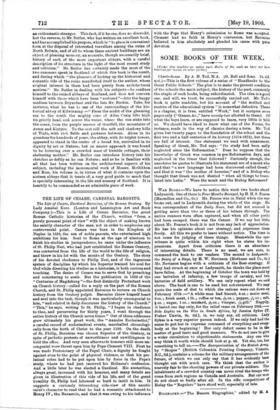THE LIFE OF CESARE, CARDINAL BARONIUS.
The Life of Cesare, Cardinal Baronius, of the Roman Oratory. By Lady Amabel Kerr. (London and Leamington Art and Book Company.)—This is a Life of Cesare Baronius, the great Roman Catholic historian of the Church, written "from a purely personal point of view" with the object of making known the saintly character of the man, not in order to emphasise any controversial point. Cesare was born in the Kingdom of Naples in 1533, the son of noble parents, who entertained high ambitions for him. Sent to Rome at the age of nineteen to finish his studies in jurisprudence, he came under the influence of St. Philip Nan, who had just established the Roman Oratory, was converted from the life of the world to the life of religion, and threw in his lot with the monks of the Oratory. The story of his devoted obedience to Philip Neri, and of the ingenious system of discipline by which his Superior trained his soul for God while directing his studies as a historian, is both curious and touching. The desire of Cesare was to serve God by preaching and ministering to souls. But the publication in 1569 of the "Centuries of Magdeburg "—the first distinctly Protestant work on Church history—called for a reply on the part of the Roman Church, and St. Philip appointed Baronius to lecture on Church history from the Oratory pulpit. Baronius threw himself heart and soul into the task, though it was particularly uncongenial to him, "and related in daily discourses the history of the Church." " This," he says, writing to St. Philip, "I began in obedience to thee, and persevering for thirty years, I went through the entire history of the Church seven times." Out of these addresses grew ultimately his great work, the " Annales Ecclesiastici," a careful record of ecclesiastical events, marshalled chronologi- cally from the birth of Christ to the year 1198. On the death of St. Philip, Baronius was chosen Superior of the Oratory, in spite of pathetic protests of unworthiness and unwillingness to hold the office. And very soon afterwards honours still more un- congenial were thrust upon him by Pope Clement VIII. First he was made Protonotary of the Papal Chair, a dignity he fought against even to the point of physical violence, so that his pre• latical robes had to be put upon him by force in the Pope's study, where he had just received his Holiness's confession. And a little later he was elected a Cardinal. His austerities, always great, increased with his honours, and many details are given in illustration of this side of his life, and of the great humility St. Philip had laboured so hard to instil in him. It suggests a curiously interesting side-view of this ascetic saint's character to read that he had a romantic attachment to Henry IV., the Navarrois, and that it was owing to his influence with the Pope that Henry's submission to Rome was accepted. Clement had no faith in Henry's conversion, but Baronius believed in him absolutely and pleaded his cause with pure devotion.






































 Previous page
Previous page